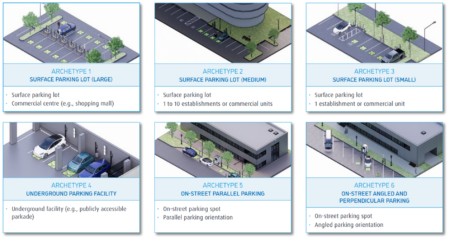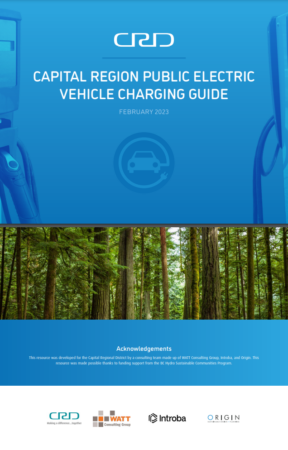WATT’s Transportation Division Continues to Build Expertise in Electric Vehicle Infrastructure Planning
WATT’s Transportation Division Continues to Build Expertise in Electric Vehicle Infrastructure Planning
In 2022-2023, WATT, in collaboration with Introba and Origin Sustainable Design + Planning, worked with the Capital Regional District (CRD) to produce the Capital Region Public Electric Vehicle Charging Guide. The charging guide, one of the first of its kind in Canada, provides guidance for businesses, property owners, and local governments to install publicly accessible electric vehicle (EV) charging stations in a consistent manner and help expand the charging network in the capital region.
Local governments have been leaders in installing and operating the public charging network to date; however, it will be critical to mobilize other sectors, including private industry, the not-profit sector, and other key players to provide public charging options to achieve the regional target. Therefore, the purpose of the Capital Region Public Electric Vehicle Charging Guide is to provide guidance to prospective site hosts—those who would own and manage an EV charging station—on several key topics including:
- The typical installation process / timeline for an EV charging station in four phases
- Common considerations that a site host would need to be aware of including the typical regulatory requirements of a local government, and what to think about when considering a contractor to design and build the EV charging station
- The overall costs of installing an EV charging station and the payback opportunities through existing rebate / funding programs and provincial policies such as BC’s Low Carbon Fuel Standard
- EV charging station design guidelines for publicly accessible EV charging stations in several common archetypes and locales in the capital region with more technical details provided in the Capital Region Public Electric Vehicle Charging Archetypes: Technical Guidelines
- Information about the science of EV charging station performance data, which allows site hosts to understand whether their stations are meeting their organizational needs and objectives, such as generating revenue and/or providing a service to the public
The charging guide builds on the CRD’s Climate Action Strategy, where it has committed to take action on the climate emergency. With on-road transportation accounting for 46% of the regional greenhouse gas (GHG) emissions in 2018, the need to electrify vehicles has been identified as a critical part of the CRD’s climate action strategy. Further, an important part of accelerating EV adoption is the provision of publicly accessible charging infrastructure to make it as easy, convenient, and accessible as possible for both prospective and current EV owners.

IMAGE: Page 16 – The charging guide provides design guidance for publicly accessible EV charging stations in six common archetypes and locales in the capital region.
As organizations in the capital region (and beyond) continue to look at opportunities to secure funding, install, and manage their EV charging stations, the Capital Region Public Electric Vehicle Charging Guide will serve a valuable resource and help the CRD achieve its charging station targets by 2030 and gradually lower its transportation emissions over time.
WATT would like to thank the CRD for the opportunity to work on this challenging, innovative, and exciting project. We would also like to acknowledge that the guide was made possible thanks to funding support from the BC Hydro Sustainable Communities Program.
More information about WATT’s transportation services are available here. WATT’s services pertaining to electric vehicles include:
- Electric vehicle strategy development
- Electric vehicle charging infrastructure gap analysis to identify optimal locations to site new charging stations
- Electric vehicle regulatory and policy development for zoning bylaws and official community plans
- Guidance on how to understand EV charging station performance data to support internal business planning and business case development
